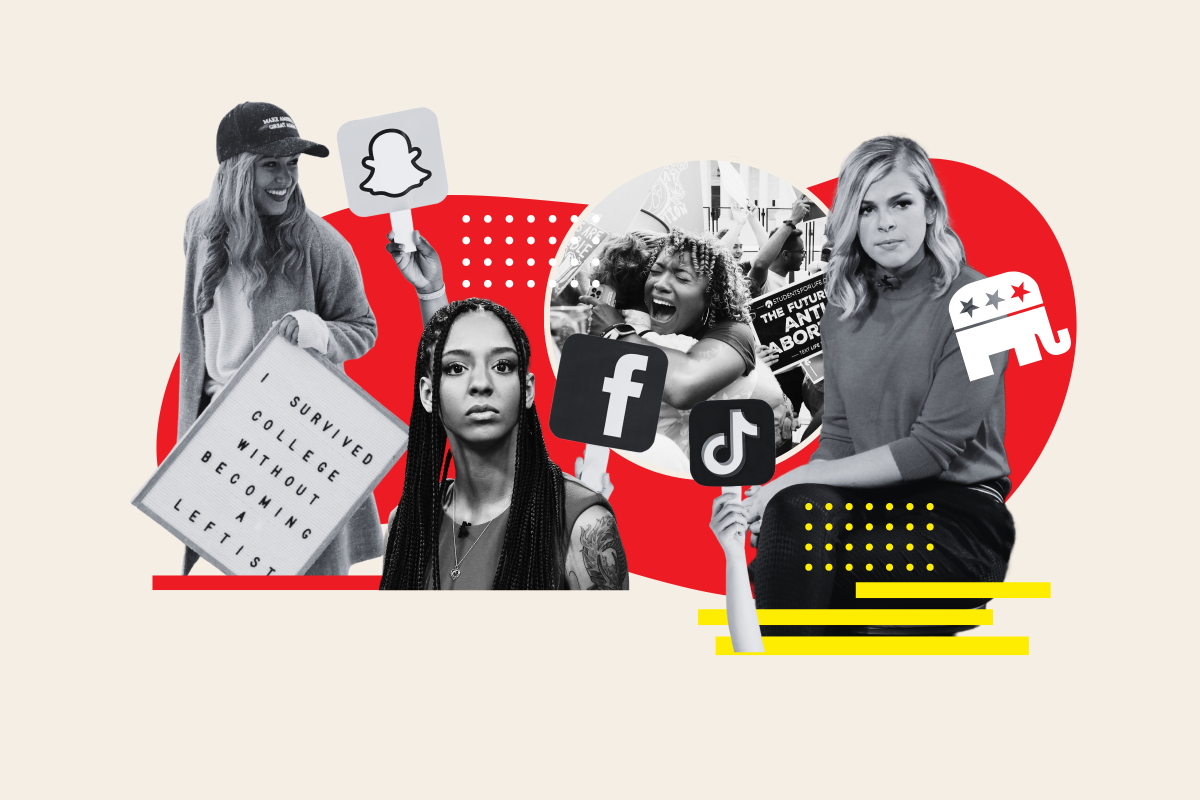The rise of the young, female conservative influencer
For years, American conservatism had a certain face. It was loud, brash and old, frequently red-faced, armed with a podcast mic and unequivocally male.
In 2025, that face is changing. Under the second Trump administration, the cultural, political and social landscape of politics and the media is shifting, ushering a new dawn for a conservative figure whose poise and position are helping to market conservativism for a new generation.
Welcome to the era of the young, conservative, female influencer.
The New Face of ConservatismThe list of young, female conservative influencers who are rising—or maintaining their prominence—on social-media platforms is long.
These women may be from different walks of life and live in different parts of the country, their content may focus on specific issues like abortion or more generally about family. What they do share, though, is a conservative belief system that prioritizes traditional gender roles and a social media presence that is as carefully curated as a good manicure.
One such woman is Isabel Brown, author and host of the Isabel Brown Show, who has amassed more than a million followers on Instagram alone. Brown is affiliated with the campus-focused conservative organization Turning Point USA, having started her own chapter at Colorado State University.
In an email to Newsweek, Brown said: "As our nation continues engaging in what we often call the "culture war," we're watching women shift substantially away from left-wing ideology in pursuit of something more fulfilling.
"We've watched voices like Jordan Peterson, Charlie Kirk and Michael Knowles connect with young men throughout the past several years on social media reminding them that masculinity is not something to shy away from, but to embrace," Brown said, adding that though most people associated "'conservative' media online with the 'podcast bro' genre," she believes the "future of conservatism is entirely dependent on this next generation of young women."
As for the message of her content? It's simple: embracing your God-given identity.
This week will mark Turning Point USA's annual Young Women's Leadership Summit in Texas. The event will feature multiple speakers, including former competitive swimmer Riley Gaines who hosts of Gaines for Girls on OutKick, Representative Beth Van Duyne of Texas, and Allie Beth Stuckey, whose value system is similar to Brown's, anchored by faith, marriage and children.
Stuckey is the host of the podcast Relatable w/ Allie Beth Stuckey, the core audience of which is women aged 25-45. She has around 667,000 followers on Instagram and another 618,000 subscribers on YouTube. In 2019, she testified before the U.S. House of Representatives during a hearing titled "Examining State Efforts to Undermine Access to Reproductive Care," and discussed anti-abortion policies.
Speaking to Newsweek over email, Stuckey said: "Conservative women are, in general, happier and more fulfilled than our progressive counterparts, and our message to young women extends beyond politics."
According to the 2024 American Family Survey, 37 percent of conservative women aged 18–40 say they are "completely satisfied" with their lives, compared with just 12 percent of their liberal peers.
Newsweek also spoke with Savannah Craven Antao, the New York-based conservative known for her YouTube channel, Her Patriot Voice.
"Most women want to embrace their femininity and feel confident choosing a path that the left and the modern feminists despise. This being opting out the 9-5 grind, choosing to not go to college, or simply marrying young and starting a family," Antao said.
Kirk, the founder of Turning Point USA, is quoted on the website for the summit, where he says that the event is "A sanctuary for women who embrace faith, family, wellness, and freedom," promising that this year's event will be the "biggest and most impactful yet," as the movement "continues to grow."
Newsweek reached out to Turning Point USA via an online contact form for comment.
 Photo-illustration by Newsweek/Getty/Canva
The Reasons Behind the Rise
Photo-illustration by Newsweek/Getty/Canva
The Reasons Behind the RiseNational polling shows no measurable migration of Gen Z women toward the political right or a revival of traditional-role attitudes—just a louder online niche.
Laura Toogood, author of the book Journalism and PR: News Media and Public Relations in the Digital Age, told Newsweek: "Social media gives influencers direct access to their audience, without the same barriers that are present when information is communicated via the mainstream media, for example, editorial guidelines.
"It is easy for certain viewpoints to gain a significant amount of traction and to gather momentum quickly, especially among a young audience who use these platforms to consume their news."
Majid KhosraviNik, a reader in digital media and discourse studies at the U.K.'s University of Newcastle, told Newsweek that that there has been a shift in both digital media and society, leading to media platforms "promoting, normalizing and widening," right-wing populist values.
Professor Karin Wahl-Jorgensen of the Cardiff School of Journalism, Media and Culture told Newsweek by email: "Social media allow for influencers of all stripes to share their content and build a following without the scrutiny of traditional media."
Social media has hit the public sphere like a hammer to an egg, and conservative and right-wing actors have risen to prominence through the fractures. And as is often the case in modern culture, it all comes back to the algorithm.
"Algorithms help to accelerate the spread of information, especially if it attracts a lot of engagement and interest, thereby showing it to an even larger audience," Toogood said.
Eviane Leidig, author of The Women of the Far Right: Social Media Influencers and Online Radicalization told Newsweek: "Social media algorithms and recommender systems play a significant role in amplifying young, politically engaged influencers, especially those with conservative and anti-feminist views. At the same time, conservative content creators are strategic in optimizing their content to gain visibility, such as clickbait titles, trending hashtags, and hot takes commentary about the culture wars.
Leidig highlighted changes at Meta in January this year, the same month Trump returned to the White House, where platforms—including Instagram—"changed their content policies to allow for more personalized political content in users' feeds."
"Users are automatically suggested political content from accounts they don't follow," she said, adding that she is increasingly recommended posts from the Trump administration.
 A view of the atmosphere at the 2019 Girlboss Rally at UCLA on June 29, 2019, in Los Angeles.
A view of the atmosphere at the 2019 Girlboss Rally at UCLA on June 29, 2019, in Los Angeles.
Emma McIntyre/Getty Images for Girlboss
A view of the atmosphere at the 2019 Girlboss Rally at UCLA on June 29, 2019, in Los Angeles.
A view of the atmosphere at the 2019 Girlboss Rally at UCLA on June 29, 2019, in Los Angeles.
Emma McIntyre/Getty Images for Girlboss
But there's another driver here—young Gen Z women who have become enchanted by a traditional political value system.
Wahl-Jorgensen said that traditionalist messages "appeal to Gen Z audiences, particularly young women, who feel disenchanted with the opportunities afforded by corporate life."
Leidig echoed this, attributing the rise in traditional value systems to "a reactionary movement against mainstream girl boss feminism."
"Many young people feel lonely and isolated, so they're searching for meaning and purpose in community, whether online or offline," Leidig said, pointing to an increase in religiosity among young people.
In the U.K., findings from YouGov and Bible Society show that 48 percent of 18- to 24-year-olds in England and Wales now say they "definitely or probably" believe in a God, gods or "some higher power"—up from just 29 percent in 2018.
And on this side of the pond, there's a similar trend, with the percentage of young adults engaging with the bible and committing to Christianity on the rise too. Findings from the American Bible Society this year showed the first increase in "bible use and scripture engagement" among younger adults since 2021.
"Young women feel pressured to 'have it all' in terms of achieving a successful career and family life, so the messaging of traditional gender roles in which women reject career demands in favor of a family is appealing," Leidig said.
Leidig also noted the impact of conservative female influencers on their male audiences, telling Newsweek that it is affecting men, who "believe that gender equality has "gone too far" and they must respond with male entitlement."
KhosraviNik told Newsweek that "Gen Z were born into a history of women activism and establishment of various equality measures in the society," adding that Gen Z see feminism as more of a "political label."
But KhosraviNik said that what conservative influencers are promoting is more about "political positioning," than feminism. "This trend will, sooner or later turn into regressive arguments, values and ideology," KhosraviNik said citing the "myth of happy subservient housewife."
"Against this culture, they may see some allure in alternative ways of womanhood in a romanticized way, as a choice, as an alternative, as a protest. Choice is in fact pretty feminist," he added.
 Anti-abortion rights demonstrators march past the U.S. Capitol to the Supreme Court for the 52nd annual March For Life in Washington on January 24, 2025.
Anti-abortion rights demonstrators march past the U.S. Capitol to the Supreme Court for the 52nd annual March For Life in Washington on January 24, 2025.
BRYAN DOZIER/Middle East Images/AFP via Getty Images
It's a New Political Era, And It's Only Just Beginning
Anti-abortion rights demonstrators march past the U.S. Capitol to the Supreme Court for the 52nd annual March For Life in Washington on January 24, 2025.
Anti-abortion rights demonstrators march past the U.S. Capitol to the Supreme Court for the 52nd annual March For Life in Washington on January 24, 2025.
BRYAN DOZIER/Middle East Images/AFP via Getty Images
It's a New Political Era, And It's Only Just Beginning"We are already seeing more and more creators share their beautiful journeys of marriage and motherhood, pursuit of faith in God, homeschooling journey, or quest to Make America Healthy Again—and I predict we are only going to see more of that content in the next few years," the content creator Isabel Brown said. She also said that we are in real time watching what she described as the "lies," sold by leftist feminism be unpacked in real time on social media.
Brown's view sits on one side of the political coin. On the other, are feminists who hold strong in their belief that feminism is essential. Catherine Rottenberg of Goldsmiths, University of London told Newsweek, "On a more profound level this is a backlash and a rejection of feminism."
"The return to gender traditionalism is part of the wider cultural shift, where reactionary politics are on the rise," Rottenberg said. "I think that we have entered dangerous and frightening times—where the gains that we have made in terms of gender equality and women's rights are being undone."
She added: "The embrace of femininity can have a feminist veneer in the sense that it can be framed as a woman's choice. However, the solutions they posit do not create a more egalitarian society nor do I think that they address the root causes of gender injustice."
Leidig told Newsweek: "The rise of conservative female influencers is concerning given that younger generations are less educated about the history and positive impact of the women's rights and feminist movements. Unfortunately, we are seeing that the success of these movements is being taken for granted today."
As for where the movement will go next? Stuckey said: "People long for more substantive commentary and debate than they did even a few years ago, when those who only churned out viral hot takes thrived. Conservative women are stepping up to the plate and will continue to."
Antao said: "Every day I see more and more young Conservative women posting their views on social media and being unapologetically themselves," adding "The movement will continue."
As for Brown? She has high hopes: "The next generation of women will revive the American family, embrace true lasting love in marriage again, experience the unparalleled joy of motherhood, seek God over government, and honor true womanhood again."
Whether their influence remakes the movement or merely refreshes its image, one thing is clear: the next chapter of American conservatism will be written as much in the glow of a ring-light as on the stump of a campaign stage.
Update 06/13/25 11:39 a.m. ET: This article has been updated to include comment from Rottenberg.
Update 06/13/25 10:34 a.m. ET: This article has been updated to include an additional comment from Leidig.